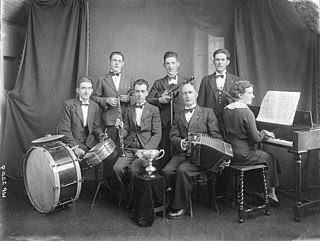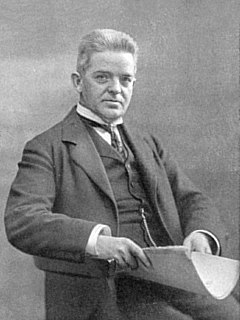Related Research Articles

A septet is a formation containing exactly seven members. It is commonly associated with musical groups but can be applied to any situation where seven similar or related objects are considered a single unit, such as a seven-line stanza of poetry. In jazz, a septet is any group of seven players, usually containing a drum set, string bass or electric bass, and groups of one or two of the following instruments, guitar, piano, trumpet, saxophone, clarinet, or trombone. See, for example, Miles Davis, and Septet by Chick Corea.

The Octet in F major, D. 803 was composed by Franz Schubert in March 1824. It was commissioned by the renowned clarinetist Ferdinand Troyer and came from the same period as two of Schubert's other major chamber works, the 'Rosamunde' and 'Death and the Maiden' string quartets.
Flute repertoire is the general term for pieces composed for flute. The following lists are not intended to be complete, but rather to present a representative sampling of the most commonly played and well-known works in the genre. The lists also do not generally include works originally written for other instruments and subsequently transcribed, adapted, or arranged for flute, unless such piece is very common in the repertory, in which case it is listed with its original instrumentation noted.

In music, an octet is a musical ensemble consisting of eight instruments or voices, or a musical composition written for such an ensemble.
In music, a nonet is a composition which requires nine musicians for a performance, or a musical group that consists of nine people. The standard nonet scoring is for wind quintet, violin, viola, cello, and contrabass, though other combinations are also found.
The Septet in E-flat major for clarinet, horn, bassoon, violin, viola, cello, and double bass, Op. 20, by Ludwig van Beethoven, was sketched out in 1799, completed, and first performed in 1800 and published in 1802. The score contains the notation: "Der Kaiserin Maria Theresia gewidmet", or translated, "Dedicated to the Empress Maria Theresa."

Viktor Kalabis was a Czech composer, music editor, musicologist, and husband of harpsichordist Zuzana Růžičková.
The Sinfonia Concertante in B flat major, by Joseph Haydn was composed in London between February and March 1792. The work is a sinfonia concertante with four instruments in the solo group: violin, cello, oboe and bassoon. It is believed to be a response to similar works composed by Ignaz Pleyel, a former student of Haydn's who London newspapers were promoting as a 'rival' to Haydn. In addition to the solo group the Sinfonia Concertante is scored for flute, 2 oboes, 2 bassoons, 2 horns, 2 trumpets, timpani and strings.
The Melos Ensemble is a group of musicians who started in 1950 in London to play chamber music in mixed instrumentation of string instruments, wind instruments and others. The ensemble's reputation for excellence has encouraged composers to write music exploring these resources. Benjamin Britten composed the chamber music for his War Requiem for the Melos Ensemble and conducted the group in the first performance in Coventry.
The Octet in E-flat major by Ludwig van Beethoven, Op. 103, is a work for two oboes, two clarinets, two bassoons, and two horns. Beethoven wrote the work in 1792 in Bonn before he established himself in Vienna. He reworked and expanded the Octet in 1795 as his first String Quintet, Op. 4. The Octet was not published until 1834 by Artaria, thus explaining the high opus number despite its date of composition.

Antonio Casimir Cartellieri was a Polish-Austrian composer, violinist, conductor, and voice teacher. His reputation dissipated after his death, not to be resurrected until the late 20th century. One son was the spa physician Paul Cartellieri. Another, Josef Cartellieri, compiled some largely second-hand biographical notes about the father he scarcely knew.
Teresa Procaccini is an Italian composer and music educator.

Carl Nielsen's Wind Quintet, or as indicated by the original score, the Kvintet for Flöte, Obo, Klarinet, Horn og Fagot, Op. 43, was composed early in 1922 in Gothenburg, Sweden, where it was first performed privately at the home of Herman and Lisa Mannheimer on 30 April 1922. The first public performance was on 9 October 1922 in the smaller hall at the Odd Fellows Mansion in Copenhagen. It is considered a staple of the repertoire for wind quintet.
Jörg Duda is a German composer of classical music.
The woodwind section, which consists of woodwind instruments, is one of the main sections of an orchestra or concert band. Woodwind sections contain instruments given Hornbostel-Sachs classifications of 421 and 422, but exclude 423
Hubert Parry's Nonet in B-flat major for nine wind instruments is a composition for chamber ensemble composed around 1877. Not performed in the composers lifetime, it remained unpublished until 1988 when Edition Compusic published the work under the posthumous opus number 70.
Franz Lachners Nonet in F major is a composition for chamber ensemble published in 1875.
Carl Reinecke's Octet in B-flat major, Op. 216 is a composition for eight wind instruments composed around 1892.

The Decet for winds in D major, Op. 14, is a chamber music work by the Romanian composer George Enescu, written in 1906 and first performed in Paris the same year. A performance lasts about 23 minutes.
References
- Notes
- ↑ Anderson 1992
- ↑ Hoover 2014
- ↑ Winther 2004 , p. 105
- ↑ Rentería 2007 , p. 60
- Sources
- Anderson, Keith (1992). Romantic Wind Music (CD). Marco Polo Records. 8.223356.
- Hoover, Michael (2014-07-10). "First Friday's Program Notes (11 July 2014)". Chicago Symphonic Winds. Retrieved 2015-10-03.
- Rentería, Lisa M. (2007). The Bassoon's Essential Role in the Evolution of the Wind Octet (PDF) (D. M. A). University of Arizona.
- Winther, Rodney (2004). An Annotated Guide to Wind Chamber Music. Alfred Music. ISBN 9781457449970.